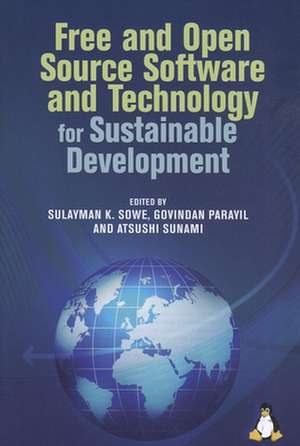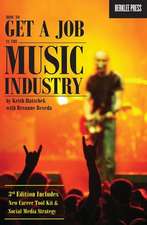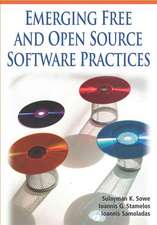Free and Open Source Software and Technology for Sustainable Development
Editat de Sulayman K. Sowe, Govinda Parayil, Atsushi Sunamien Limba Engleză Paperback – 2 noi 2012
Free and Open Source Software (FOSS) technologies transcend geographical and cultural boundaries to usher in a new development paradigm where volunteers collaboratively create software for common use. The political economy of FOSS technologies has far-reaching implications for world development because of the centrality of information and communications technologies for development (ICT4D). The global trend in the diffusion and adoption of FOSS technologies is a testimony to the socioeconomic and technological impact the software has for both developed and developing economies.
The main aim of this book is to raise awareness, increase the deployment, and capture the socioeconomic, technical, and educational impact of information and communications technologies in general, and free and open source software in particular, for sustainable development. A global collection of experts in social, natural, and human sciences, with contributions from researchers and practitioners in both developing and developed countries, cover the theoretical and practical implications of FOSS technologies.
While FOSS development, education, and business potentials may appear as a phenomenon for the developed world, a sizable number of developing countries have implemented FOSS policies of their own. Empirical and anecdotal evidence continues to demonstrate the potential of FOSS technologies for giving people the opportunity to participate actively in the development and shaping of their own technology, stimulating the growth of indigenous software industries, creating local jobs, and lowering technology acquisition and deployment costs.
The target audience of the book includes ICT4D and sustainable development experts, FOSS developers and users, policymakers, technology-oriented small and medium enterprises, NGOs working in ICT and sustainable development, international organizations with technology transfer initiatives, information systems practitioners and research institutions, curriculum designers, universities and colleges, and training institutions interested in the pedagogical aspects of FOSS technologies.
The main aim of this book is to raise awareness, increase the deployment, and capture the socioeconomic, technical, and educational impact of information and communications technologies in general, and free and open source software in particular, for sustainable development. A global collection of experts in social, natural, and human sciences, with contributions from researchers and practitioners in both developing and developed countries, cover the theoretical and practical implications of FOSS technologies.
While FOSS development, education, and business potentials may appear as a phenomenon for the developed world, a sizable number of developing countries have implemented FOSS policies of their own. Empirical and anecdotal evidence continues to demonstrate the potential of FOSS technologies for giving people the opportunity to participate actively in the development and shaping of their own technology, stimulating the growth of indigenous software industries, creating local jobs, and lowering technology acquisition and deployment costs.
The target audience of the book includes ICT4D and sustainable development experts, FOSS developers and users, policymakers, technology-oriented small and medium enterprises, NGOs working in ICT and sustainable development, international organizations with technology transfer initiatives, information systems practitioners and research institutions, curriculum designers, universities and colleges, and training institutions interested in the pedagogical aspects of FOSS technologies.
Preț: 315.57 lei
Nou
Puncte Express: 473
Preț estimativ în valută:
60.38€ • 63.21$ • 49.96£
60.38€ • 63.21$ • 49.96£
Carte tipărită la comandă
Livrare economică 07-21 aprilie
Preluare comenzi: 021 569.72.76
Specificații
ISBN-13: 9789280812176
ISBN-10: 9280812173
Pagini: 404
Dimensiuni: 152 x 229 x 23 mm
Greutate: 0.52 kg
Editura: Brookings Institution Press
Colecția United Nations University Press
ISBN-10: 9280812173
Pagini: 404
Dimensiuni: 152 x 229 x 23 mm
Greutate: 0.52 kg
Editura: Brookings Institution Press
Colecția United Nations University Press
Notă biografică
Sulayman K. Sowe is JSPS-UNU Fellow, Science and Technology for Sustainable Societies, at the United Nations University Institute of Advanced Studies, Japan. Govindan Parayil is vice rector at United Nations University and director of the United Nations University Institute of Advanced Studies. Atsushi Sunami is associate professor at the National Graduate Institute for Policy Studies, Japan.
Descriere
Free and Open Source Software (FOSS) technologies transcend geographical and cultural boundaries to usher in a new development paradigm where volunteers collaboratively create software for common use. The political economy of FOSS technologies has far-reaching implications for world development because of the centrality of information and communications technologies for development (ICT4D). The global trend in the diffusion and adoption of FOSS technologies is a testimony to the socioeconomic and technological impact the software has for both developed and developing economies.
The main aim of this book is to raise awareness, increase the deployment, and capture the socioeconomic, technical, and educational impact of information and communications technologies in general, and free and open source software in particular, for sustainable development. A global collection of experts in social, natural, and human sciences, with contributions from researchers and practitioners in both developing and developed countries, cover the theoretical and practical implications of FOSS technologies.
While FOSS development, education, and business potentials may appear as a phenomenon for the developed world, a sizable number of developing countries have implemented FOSS policies of their own. Empirical and anecdotal evidence continues to demonstrate the potential of FOSS technologies for giving people the opportunity to participate actively in the development and shaping of their own technology, stimulating the growth of indigenous software industries, creating local jobs, and lowering technology acquisition and deployment costs.
The target audience of the book includes ICT4D and sustainable development experts, FOSS developers and users, policymakers, technology-oriented small and medium enterprises, NGOs working in ICT and sustainable development, international organizations with technology transfer initiatives, information systems practitioners and res
The main aim of this book is to raise awareness, increase the deployment, and capture the socioeconomic, technical, and educational impact of information and communications technologies in general, and free and open source software in particular, for sustainable development. A global collection of experts in social, natural, and human sciences, with contributions from researchers and practitioners in both developing and developed countries, cover the theoretical and practical implications of FOSS technologies.
While FOSS development, education, and business potentials may appear as a phenomenon for the developed world, a sizable number of developing countries have implemented FOSS policies of their own. Empirical and anecdotal evidence continues to demonstrate the potential of FOSS technologies for giving people the opportunity to participate actively in the development and shaping of their own technology, stimulating the growth of indigenous software industries, creating local jobs, and lowering technology acquisition and deployment costs.
The target audience of the book includes ICT4D and sustainable development experts, FOSS developers and users, policymakers, technology-oriented small and medium enterprises, NGOs working in ICT and sustainable development, international organizations with technology transfer initiatives, information systems practitioners and res

















